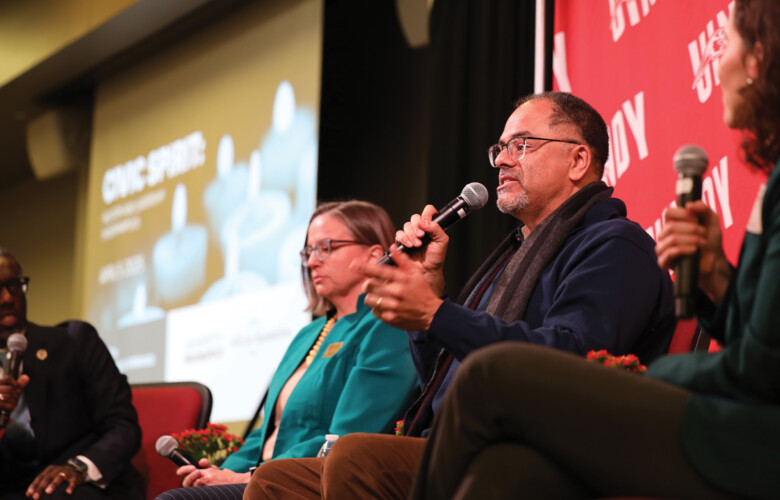What We Learned During the 2025 Fairbanks Symposium on Civic Leadership
April 17, 2025On April 9, 2025, the University of Indianapolis and Indiana Humanities hosted the Tenth Richard M. Fairbanks Symposium on Civic Leadership. Our theme, Civic Spirit: Religion and Leadership in Indianapolis,…
On April 9, 2025, the University of Indianapolis and Indiana Humanities hosted the Tenth Richard M. Fairbanks Symposium on Civic Leadership. Our theme, Civic Spirit: Religion and Leadership in Indianapolis, resonated with all attendees regardless of their faith traditions and personal experiences.
Our morning kicked off by with an insightful exploration of how religion had formed Indiana’s civic fabric. Moderator Joseph L. Tucker Edmunds (IU-Indianapolis) facilitated a thoughtful conversation with Professors Edward Curtis (IU-Indianapolis), Janine Giordano Drake (IU-Bloomington), and Wendy Soltz (Ball State University) that demonstrated the surprising diversity of religious expression in Indiana’s past. These historians reminded us that while common narratives of Indiana’s white Protestant (and largely Methodist) majority have deemphasized Indiana’s original religious diversity, Hoosiers have always had pluralistic religious identities, including Jews, Muslims, Catholics, nonbelievers and many more from Indiana’s earliest days.
The day’s keynote featured political scientists Gregory Shufeldt (University of Indianapolis) and David Campbell (Notre Dame University), who parsed some of the insights from the recent 2025 Pew Religious Landscape Study. This rich report demonstrates surprising trends; Although the share of nonbelievers among young people has increased the decline in Christianity may have leveled off. Campbell and Shufeldt also noted that whereas religion might have once bridged communities of difference, they may now increasingly bond more similar communities together.
Our third panel of the day explored the question: “What is the Relationship between Personal Faith and Civic Leadership?” Moderated by Libby Davis Manning (Wabash Pastoral Leadership Program), this panel, comprised mostly of faith leaders, decried the ways in which some leaders had used religious posturing to erode rights that many faith backgrounds consider to be distinctly American. Panelists Carlos Perkins (Bethel Cathedral AME), David Sklar (Indianapolis Jewish Community Relations Council), Beau Underwood (Allisonville Christian Church), Jennifer Baskerville-Burrows (Episcopal Diocese of Indianapolis) and Ahmed Alamine (Indianapolis Muslim Association). They collectively challenged the audience to keep walking even in the dark, play the long game, and to build and join institutions.
Upon our conclusion, symposium organizer Edward Frantz (University of Indianapolis), summed up by linking former Indianapolis Mayor Bill Hudnut, theologian Reinhold Niebuhr, Martin Luther King, Jr., and Stevie Wonder, with a discussion of how both Hudnut and Niebuhr seemed uniquely interested in the civic religion of Abraham Lincoln.
Five key takeaways from the day included:
- Religion in America is all about congregations, and Indiana is no different. As Americans, our experience of religion is inextricable from our understanding of congregations that make and maintain religious communities.
- Houses of worship are places where civic skills—working together, compromising, meeting the diverse needs of congregants—are learned.
- The secular surge may be over?
- For many of our religious leaders their community’s faith has always been embedded in — rather than separate from — civic life.
- Accurate historical memory can and should lead to active civic leadership. Throughout the day, panelists urged us to understand the rich religious practices in Indiana and to see that in many places and in many contexts, those practices were directly tied to civic participation.


